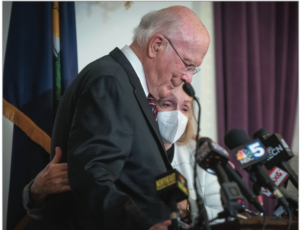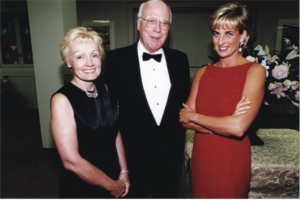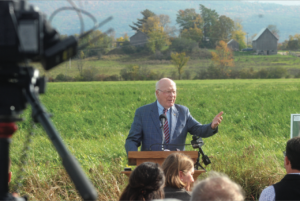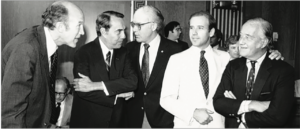By John Flowers/Addison County Independent
You won’t find a lot of framed press clippings in the office of Patrick Leahy, the longest-serving member of the U.S. Senate. But there are two that stand out.
One features a Vermont newspaper report that came out five days before the Nov. 5, 1974, General Election.

Sen. Patrick Leahy, supported by his wife Marcelle, pauses while announcing on Nov. 15, 2021, that he would step down at the end of this term, his eighth in the Senate.
The banner headline reads, “Poll Dooms Leahy.”
The Chittenden County state’s attorney understood his long odds at that time. Vermont was as red then as it is blue today. After all, he was a 34-year-old Democrat in a state that had never elected a Democrat to a top federal post, hadn’t been keen on electing Catholics and preferred its candidates to be conservatives older than 50.
“Everyone assumed I shouldn’t be in there,” Leahy told the Independent during a recent interview.
Well, certainly not everyone.
His second “keeper” newspaper features a report of the 1974 election result: “Leahy Unexpectedly Wins.” He had defeated Republican Richard W. Mallary, 70,629 to 66,223, in the contest to succeed retiring incumbent U.S. Sen. George Aiken, a Republican.
His election-night joy was quickly tempered by the real possibility his stay in Washington, D.C., could be a brief one; had his win simply been an anomaly in GOP-dominated Vermont?
“I got here and said, ‘Look, this might be one term. Let’s make the most of it, not just do things for soundbites,’” Leahy said.
He went on to make the most of it — for the ensuing 48 years. The unexpected became the usual; Leahy, for the most part, has been as sure a bet on election day as the sun rising in the East.
The state’s senior senator can’t help but marvel at his own staying power.
“I’ve cast over 17,000 votes,” Leahy said. “I’ve served with 20% of all the U.S. senators in the history of this country. I will have served longer than any senator who walked out of (the Capitol Building). A couple served longer, but they died in office.”
But longevity by itself doesn’t matter if you can’t get things done while in office. And as Leahy serves out the final few months of his senatorial career, he has quite a list of accomplishments to take with him when he retires to his home state. He told a reporter that before introducing legislation, he subjects it to a consistent litmus test: Would it measure up to Vermonters’ expectations and the principles imparted to him by his family?
“I felt I owed them something,” he said of his constituents.
His accomplishments, according to his office, have included:
- Four legislative achievements that bear his name — the Leahy Law (the foremost tool used in promoting human rights abroad), the Leahy War Victims Fund, the Leahy-Smith America Invents Act and the Patrick Leahy Bulletproof Vest Partnership Grant Program.
- On the Appropriations Committee, which he now leads, he’s steered billions of dollars in federal investments to Vermont — most recently, in the drafting of COVID relief bills. He also helped secure more than $500 million to help Vermont rebuild following Tropical Storm Irene.
- Directing seed funding and capital for the Vermont Center for Emerging Technologies incubator to help entrepreneurs build their companies and employ Vermonters, and organized the annual Vermont Women’s Economic Opportunity Conference, where more than 3,000 Vermont women have gathered to learn and hone skills for business success.
- Securing annual funding for Lake Champlain cleanup and for a wide range of other Vermont priorities, including to address the opioid epidemic, restorative justice initiatives and the Vermont dairy industry.

Sen. Patrick Leahy shown with his wife Marcelle (left) at a Red Cross dinner in June 1997. Leahy recruited Princess Diana (right) as an ally in his effort to ban land mines.
- Advocating for the addition of more than 140,000 acres to the Green Mountain National Forest.
- Authoring the John Lewis Voting Rights Advancement Act, and the Innocence Protection Act — death penalty reform legislation that has widened the use of DNA evidence to exonerate the innocent and convict the guilty.
- Participating in the confirmation hearing of every justice currently serving on the U.S. Supreme Court.
- Working with Democratic and Republican administrations to change the Cold War policies toward Cuba as well as restore diplomatic relations and support post-war legacy programs in Vietnam.
The Leahy law
Leahy singled out some of his favorite legislative legacies, including passage of The Leahy Law, which bars U.S. foreign aid to units of foreign militaries that violate the rights of their citizens.
“A number of times, these countries have applied for more aid, and it’s been said, ‘We have to ‘Leahy’ that first,’” he said proudly.
He’s very proud of what’s now known as “The Leahy War Victims Fund,” used by USAID throughout the world to help civilians maimed by landmines and other weapons of war. Its genesis dates to 1989 and a trip Leahy made to southeast Asia.
“It was after something I observed while landing at a field hospital in a helicopter in the middle of a jungle during a civil war,” he recounted. “Seeing a 12-year-old child with one leg; he had stepped on a landmine.”
Leahy said he asked the boy if he knew which country was responsible for laying the landmine.
“I don’t think he knew which country was which, he just knew his life was basically ruined as a farmer in the jungle,” he said.
In addition to imparting much-needed help to civilians who have suffered debilitating injuries from landmines, the Leahy War Victims Fund helped thaw U.S. relations with Vietnam, the senior senator noted.

U.S. Sen. Patrick spoke at the ceremonial groundbreaking of a 5-Megawatt solar farm off South Street Extension in Middle- bury in October 2021 that now delivers renewable energy to Middlebury College.
He recalled a subsequent trip to Vietnam during which wheelchairs were given out to people with war-related disabilities. Leahy remembers encountering, at one of their appearances, a Vietnamese national — whose legs had been taken by a landmine — who stared vindictively at the senator, initially seeing him as a leader of the country responsible for his injuries.
Leahy said he went over to the man, took him in his arms, and placed him in one of the wheelchairs.
“I started to stand up, and he grabbed my shirt, pulled me down, and kissed me,” Leahy recalled, still touched by the incident.
Leahy has long been part of a worldwide effort to ban the production, use and proliferation of landmines. In 1992, he sponsored an amendment to stop U.S. exports of anti-personnel landmines. In 1993, an amendment to extend the ban passed the Senate 100-0, and President Bill Clinton adopted it as a permanent U.S. policy in 1997.
“There are no good endings with landmines,” he said.
Patrick and Marcelle Leahy have made several more trips to Vietnam during the past three decades, visiting hospital patients who continue to be maimed by unexploded ordinance and rendered deathly ill by Agent Orange, a chemical herbicide and defoliant that U.S. forces spread liberally across the jungles of that Asian nation during the 10-year war.
Helping farmers
Leahy is also pleased to have been part of bipartisan congressional coalitions that have passed meaningful agricultural legislation, including the Organic Foods Production Act that was made part of the 1990 Farm Bill. This bill, which finally produced credible federal standards for organic farming, occurred while Leahy chaired the Senate Agriculture Committee.
Organic farming is now an annual $55 billion-$65 billion industry, Leahy noted.
“Those (proposed standards) had always been opposed until I was chair, because they said (organic farming) was a nothing, worthless industry,” he said.

Vermont Democrat Patrick Leahy has forged alliances on both sides of the aisle during a 48-year career in the U.S. Senate. Above he was chatting with Senate icons in 1975. Pictured (l-r) are: Republicans Alan Simpson and Bob Dole, Leahy, Democrat Joe Biden and Republican Charles Mathias.
Leahy isn’t spending his final weeks in office taking farewell bows. He’s Senate President pro tem and is vice chair of the Senate Appropriations Committee, so he continues to keep a busy legislative schedule until he leaves office on Jan. 3, 2023. He’d like to see Congress pass meaningful legislation on climate change, voting rights and a number of other issues before he retires, but doesn’t believe the parties will be able to reach bipartisan agreement.
“We’re dealing with the most divided House and Senate that I’ve seen in 48 years,” he lamented.
Backing Ukraine
Leahy said support for Ukraine in its resistance to invading Russian forces is one area where there appears to be widespread support. He praised President Joe Biden for his leadership on that issue.
“I think he’s done a superb job putting the NATO allies together,” he said. “I’ve had so many of our allies around the world tell me Trump had done everything possible to alienate the members of the NATO coalition… I have these inter-parliamentary meetings all the time, and they go out of their way to say that Joe Biden has been perfect, because he has credibility. He talks to them all the time. You don’t read about it in the papers, but he keeps up their confidence, and vice versa.”
He noted former President Donald Trump has announced his bid to regain the presidency in 2024 and believes his election would be a setback for the U.S. and its relations with other nations — including Ukraine. He recalled Trump’s praise of Vladimir Putin, who initiated the Ukraine invasion.
“I know Donald Trump said he thought Putin was a ‘genius,’ but most of us — Republicans and Democrats alike — think he’s a war criminal,” Leahy said.
He’s impressed by what has become an international resolve to punish Russia for its incursion.
“Vladimir Putin never thought the NATO alliance could have come together like this,” Leahy said. “It was one of the big mistakes Putin made; the other was that the Ukrainians wouldn’t fight.”
More time in Vermont
Leahy said he and his family decided three years ago this would be his final term. It was time to spend more time in Vermont, with friends and family, and let someone else take his place.
He drew a lot of kind words and testimonials after delivering his retirement speech on Nov. 15, 2021.
Among those saluting Leahy was Republican Vermont Gov. Phil Scott.
“The Senator has been an incredible champion for Vermonters, and his leadership and experience has ensured our state is well represented in Congress,” he said. “It is thanks to him, and the funding he’s secured for our state, that Vermont is in a position to come out of this pandemic stronger than before and tackle big challenges from broadband and infrastructure to the opioid crisis. We are indebted to him.”
Leahy’s Vermont colleague, Independent U.S. Sen. Bernie Sanders, also offered praise.
“He has been a towering figure as chairman of the Agriculture Committee, the Judiciary Committee, and the Appropriations Committee,” he said. “He leaves a unique legacy that will be impossible to match.”
And this, from the man who will take Leahy’s place — Vermont Congressman Peter Welch:
“Patrick’s life as our longest-serving senator has been dedicated to serving Vermont, always putting Vermonters and their values and aspirations first,” the Democrat said. “Patrick loves Vermont, and Vermonters love Patrick. While Patrick has been a giant in the U.S. Senate, consulted by presidents and world leaders, he is always happiest on his farm in Middlesex and being with his fellow Vermonters. He never left his roots in Montpelier or the values of his parents, who instilled decency, honesty, and service.”
Leahy will soon be cleaning out his D.C. office. The two framed newspaper stories that misjudged his appeal and staying power will of course come with him.
“I never expected to be here for eight terms. Vermonters could have tossed me out at any time,” he said.
“I’m glad they didn’t.”
Editor’s note: See related guest editorial in this edition.




